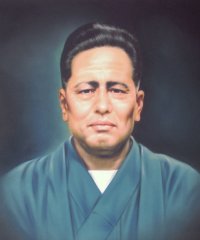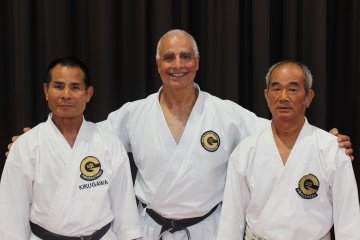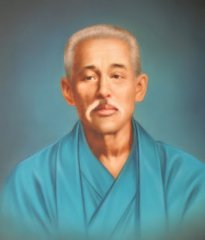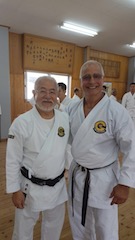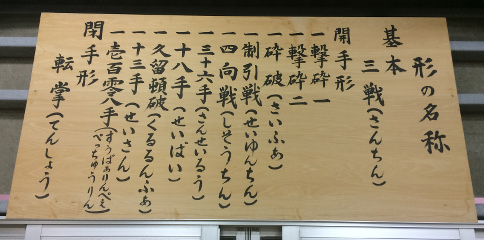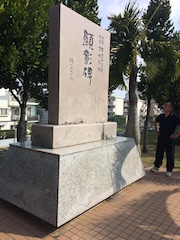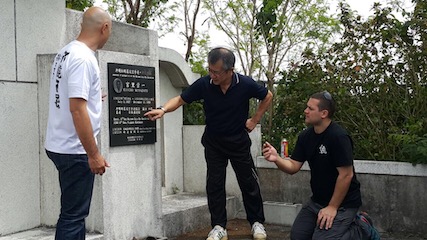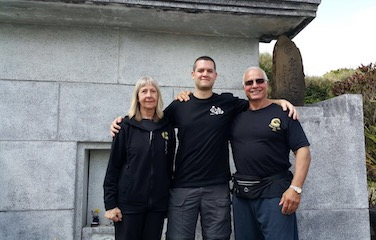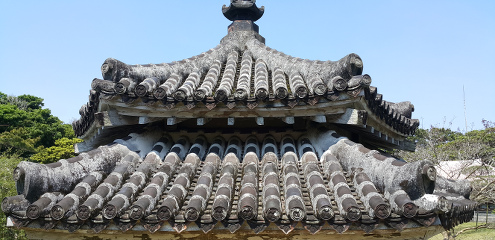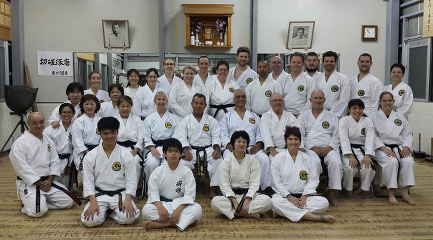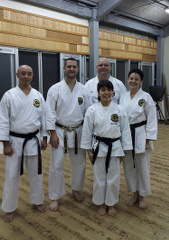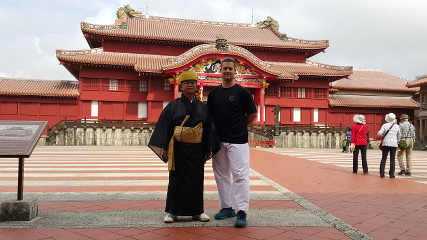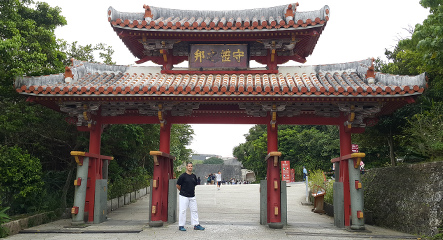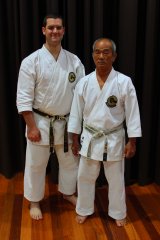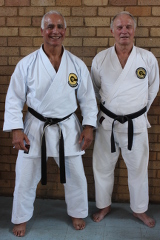You Are Here: About » Dojo Kun
Ethics (Dojo Kun):
One feature of training in a karate dojo in the East which is not often met in the West is the practice of reciting the kun or code of ethics at the end of a training session. GW Nicol, in his book; Moving Zen: Karate as a Way to Gentleness, refers to this practice and its place in karate-do:
"The Oath was always chanted with strength, never mumbled in insincerity. Just as movements would become automatic and reflexes conditioned, the simple truths of the oath would also penetrate the mind of the participant."
The form of the dojo kun can vary from style to style or dojo to dojo, but in general the sentiments and basic ideas involved agree in most respects.
The dojo kun are guidelines that help us form a strong, yet flexible character, by emphasising the need for humility, patience and calmness. They should not be thought of as esoteric commandments, but instead as common-sense guidelines that will help us in our daily lives and complement the physical training.
The dojo kun are all inter-related, but the main emphasis is to develop character and to balance the physical and philosophical aspects with one another. Austere physical training is only beneficial if conducted intelligently and in tune with your own body's requirements and abilities.
True progress in the martial arts is only possible if we cultivate ourselves as morally upright people. According to Shoshin Nagamine's book "Tales of Okinawa's Great Masters", this maxim was taught by Kanryo Higaonna as bun bu ryo do i.e. philosophical and physical are one study. The same princple was also expounded by the renowned White Crane and Tai Chi Master Huang Sheng Shyan.
In normal practice this would be chanted after a short period of meditation (Mokuso) at the end of a class. The usual procedure is for the senior student in the class to say one line which is them repeated by the whole class until the sequence is complete.
Here are the eight precepts...
Be humble and polite
Bob Honiball once asked Sensei Miyazato what he considered to be the greatest gift he had from Karate. His answer was simply "humility".
One must be humble in order to learn from our teachers, our peers and our students. It takes strength of character to learn from our mistakes and failures, and to continue to grow as people, even when we begin to realise just how little we really know about ourselves.
If we are truly humble, then it is entirely natural to be polite with others.
Train considering your physical strength
Training should build resilience, health and fitness. Too much training, or overstressing the body, can cause physical deterioration instead of development and even lead to illness, whilst too little will provide insufficient benefit. The aim should be to train in accordance with your ability and push yourself a little bit beyond what you are currently capable of. As you gradually build intensity and quality, over the years, your body will grow stronger.
Practice earnestly and with creativity
The purposes of training must be borne in mind during practice and you should strive earnestly towards them. As such, use your creativity and intelligence to structure your training in way that is productive and makes the best possible use of your circumstances and environment.
Practice with the serious and honest intention to improve yourself, physically and mentally, in the full knowledge that you are actively preserving your health for everyday living and preparing yourself to deal calmly with dangerous situations.
Quality should be emphasised more than quantity. Practicing one million punches incorrectly will over time ensure that you are very good at performing poor quality punches, regardless of how "hard" you may have trained. "Little and often" is the key. Frequent periods of correct practice, perhaps one or two hours per day, will be far more valuable than a marathon effort once a month.
Be calm in mind and swift in action
If the mind is calm, instead of agitated, then it can efficiently use the senses to perceive movement and threats, and so direct the body to react. Correct relaxation in the body also springs from a calm and relaxed mind. If the mind is tense, then the body will also be tense. Consequently, it will be very difficult to react quickly and appropriately in stressful or dangerous situations. If the mind is calm, the body can let go of unnecessary tensions.
If the body is inappropriately tense during a particular movement or in a fixed position, it cannot react and change to another movement unless it first relaxes, thus introducing an unnecessary delay. Furthermore, the body and limbs will move much slower if the wrong muscles are engaged, as they will have a braking or destabilising effect. It is therefore important to ensure that the only tensions are those actually required to perform the movement - no more and no less.
Take care of your health
It is good self-defence to maintain a healthy body and mind. In addition to exercise, it is just as important to eat and sleep properly, avoid over-indulgence, keep your body clean and look after your teeth. This apparently "obvious" advice will help keep your body free from disease and injury.
Live a plain and simple life
For the mind to properly engage with the practice, there must be as few distractions as possible. The dojo is a place where distractions have been removed, so there it is possible to practice. However, if we are to progress as Karate-ka and grow as people, the mental and philosphical aspects of practice must also extend beyond the dojo into our daily lives. This will not be easy to achieve if our lives are either too flamboyant, materialistic or cluttered.
The renowned White Crane and Tai Chi Master Huang Sheng Shyan has often been quoted as saying "neither the very rich nor the very poor would succeed in learning (Tai Chi) as they were both too concerned with money".
Do not be too proud or modest
The more we learn about ourselves and about Karate Do, the more we come to realise just how much we don't know, and that our current knowledge really is just the tip of the iceberg. It is natural to feel a bit of pride, or at least self respect, in our achievements or abilities, but this should be tempered by the knowledge that, in the grand scheme of things, we have barely begun.
Excessive pride is to overstate, or attach too much importance to, our achievements and abilities. Excessive modesty is to attach too little importance. In its extreme this may even be pride in disguise. For example "false modesty", where we deliberately play down our qualities in the hopes that someone will tell us that we are in fact really amazing!
Continue training steadfastly with patience
The effects of training the mind and body are gradual, cumulative and cannot be rushed. However, adhering to the correct principles and methods, under the guidance of a good teacher, will bring development in the optimum time period.
In the begining the body feels awkward and clumsy but, even after just one or two years of diligent practice, the change in an individual's bearing, confidence and sure-footedness is noticeable.
The modern world presents us with quick fixes, fast-food and labour saving devices. There are no such parallels in Karate-Do and it can be difficult to accept that mastery can never be achieved by simply turning up at the dojo twice a week, paying the fees and then sweating for a couple of hours.
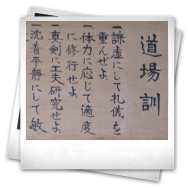
In these eight precepts, we have the essence of a teaching that enables karate to be seen as something more than simply a method of random mayhem or a modern competitive sport. This is the morality which is needed to balance the physical in training. It is the foundation of what is called "right action" (Samma-kammanta); ignoring the beliefs and ideas encapsulated in the dojo kun will in the long run have a negative effect both on the individual martial artist and on the evolution of karate as a whole.
|
